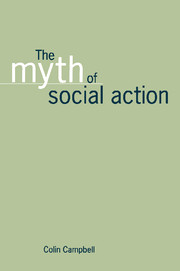Book contents
- Frontmatter
- Contents
- 1 Introduction
- 2 Action reported missing in action theory
- 3 Action and social action
- 4 Action versus social action
- 5 The rise of social situationalism
- 6 The argument by denial
- 7 Accounts and actions
- 8 The argument by exclusion
- 9 The argument through incorporation
- 10 The ‘learning everything from others’ thesis
- 11 The communicative act paradigm
- 12 The linguistic turn for the worse
- 13 The myth of social action
- 14 The obstacle which is social situationalism
- 15 Epilogue: bringing action back in
- Notes
- Bibliography
- Index
12 - The linguistic turn for the worse
Published online by Cambridge University Press: 07 May 2010
- Frontmatter
- Contents
- 1 Introduction
- 2 Action reported missing in action theory
- 3 Action and social action
- 4 Action versus social action
- 5 The rise of social situationalism
- 6 The argument by denial
- 7 Accounts and actions
- 8 The argument by exclusion
- 9 The argument through incorporation
- 10 The ‘learning everything from others’ thesis
- 11 The communicative act paradigm
- 12 The linguistic turn for the worse
- 13 The myth of social action
- 14 The obstacle which is social situationalism
- 15 Epilogue: bringing action back in
- Notes
- Bibliography
- Index
Summary
Since the comunicative act paradigm draws very heavily on the study of language and meaning, with speech treated as exemplifying communicative action, it is hardly surprising to discover that situationalism itself has come to prominence as part of a broader post-war interest in language. Indeed, in large measure the rise of social situationalism has happened principally because British sociologists have been persuaded that the philosophy of language had something useful to offer the discipline. In particular, they came to believe that the study of human action could profit from the conclusions reached by linguistic philosophers and philosophers of ordinary language concerning the nature and origin of meaning. Philosophers had, for their own reasons, taken a ‘linguistic turn’ in the early 1960s, and by the 1970s and early 1980s many micro-sociologists seemed eager to follow suit. But it is now clear that this ‘linguistic turn’ has proved to have been a turn for the worse, if not for sociology as a whole, certainly for the sociology of action and the interpretive tradition. This is because the assumption of an extensive parallelism between language and action is deeply misleading, as there is a fundamental difference between identifying the meaning of a symbol and establishing the meaning of an event such as an act. Consequently, conclusions arrived at from the study of meaning and language cannot be safely carried over into the study of action. For although it might appear that there is a similar concern with the study of ‘meaning’ in both cases the many differences between the two phenomena are such as to render these totally dissimilar exercises.
- Type
- Chapter
- Information
- The Myth of Social Action , pp. 132 - 139Publisher: Cambridge University PressPrint publication year: 1996



